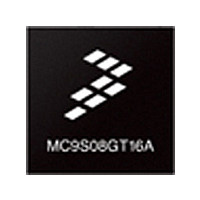MC9S08GT16CFB Freescale Semiconductor, MC9S08GT16CFB Datasheet - Page 194

MC9S08GT16CFB
Manufacturer Part Number
MC9S08GT16CFB
Description
Manufacturer
Freescale Semiconductor
Datasheet
1.MC9S08GT16CFB.pdf
(290 pages)
Specifications of MC9S08GT16CFB
Cpu Family
HCS08
Device Core Size
8b
Frequency (max)
20MHz
Interface Type
SCI/SPI
Program Memory Type
Flash
Program Memory Size
16KB
Total Internal Ram Size
1KB
# I/os (max)
36
Number Of Timers - General Purpose
4
Operating Supply Voltage (typ)
2.5/3.3V
Operating Supply Voltage (max)
3.6V
Operating Supply Voltage (min)
2.08V
On-chip Adc
8-chx10-bit
Instruction Set Architecture
CISC
Operating Temp Range
-40C to 85C
Operating Temperature Classification
Industrial
Mounting
Surface Mount
Pin Count
44
Package Type
PQFP
Lead Free Status / Rohs Status
Not Compliant
Available stocks
Company
Part Number
Manufacturer
Quantity
Price
Company:
Part Number:
MC9S08GT16CFBE
Manufacturer:
FREESCALE
Quantity:
1 831
Company:
Part Number:
MC9S08GT16CFBE
Manufacturer:
Freescale Semiconductor
Quantity:
10 000
Part Number:
MC9S08GT16CFBE
Manufacturer:
FREESCALE
Quantity:
20 000
Company:
Part Number:
MC9S08GT16CFBER
Manufacturer:
Freescale Semiconductor
Quantity:
10 000
- Current page: 194 of 290
- Download datasheet (2Mb)
Serial Peripheral Interface (SPI) Module
When CPHA = 1, the slave begins to drive its MISO output when SS1 goes to active low, but the data is
not defined until the first SPSCK edge. The first SPSCK edge shifts the first bit of data from the shifter
onto the MOSI output of the master and the MISO output of the slave. The next SPSCK edge causes both
the master and the slave to sample the data bit values on their MISO and MOSI inputs, respectively. At the
third SPSCK edge, the SPI shifter shifts one bit position which shifts in the bit value that was just sampled,
and shifts the second data bit value out the other end of the shifter to the MOSI and MISO outputs of the
master and slave, respectively. When CHPA = 1, the slave’s SS input is not required to go to its inactive
high level between transfers.
Figure 12-6
for reference with bit 1 starting as the slave is selected (SS IN goes low), and bit 8 ends at the last SPSCK
edge. The MSB first and LSB first lines show the order of SPI data bits depending on the setting in LSBFE.
Both variations of SPSCK polarity are shown, but only one of these waveforms applies for a specific
transfer, depending on the value in CPOL. The SAMPLE IN waveform applies to the MOSI input of a
slave or the MISO input of a master. The MOSI waveform applies to the MOSI output pin from a master
and the MISO waveform applies to the MISO output from a slave. The SS OUT waveform applies to the
slave select output from a master (provided MODFEN and SSOE = 1). The master SS output goes to active
low at the start of the first bit time of the transfer and goes back high one-half SPSCK cycle after the end
of the eighth bit time of the transfer. The SS IN waveform applies to the slave select input of a slave.
194
(MISO OR MOSI)
(MASTER OUT)
(REFERENCE)
(SLAVE OUT)
SAMPLE IN
MSB FIRST
BIT TIME #
(CPOL = 0)
(CPOL = 1)
LSB FIRST
(MASTER)
(SLAVE)
SS OUT
SPSCK
SPSCK
SS IN
MOSI
MISO
shows the clock formats when CPHA = 0. At the top of the figure, the eight bit times are shown
BIT 7
BIT 0
1
Figure 12-6. SPI Clock Formats (CPHA = 0)
MC9S08GB/GT Data Sheet, Rev. 2.3
BIT 6
BIT 1
2
...
...
...
BIT 2
BIT 5
6
BIT 1
BIT 6
7
BIT 0
BIT 7
8
Freescale Semiconductor
Related parts for MC9S08GT16CFB
Image
Part Number
Description
Manufacturer
Datasheet
Request
R
Part Number:
Description:
Manufacturer:
Freescale Semiconductor, Inc
Datasheet:
Part Number:
Description:
Manufacturer:
Freescale Semiconductor, Inc
Datasheet:
Part Number:
Description:
Manufacturer:
Freescale Semiconductor, Inc
Datasheet:
Part Number:
Description:
Manufacturer:
Freescale Semiconductor, Inc
Datasheet:
Part Number:
Description:
Manufacturer:
Freescale Semiconductor, Inc
Datasheet:
Part Number:
Description:
Manufacturer:
Freescale Semiconductor, Inc
Datasheet:
Part Number:
Description:
Manufacturer:
Freescale Semiconductor, Inc
Datasheet:
Part Number:
Description:
Manufacturer:
Freescale Semiconductor, Inc
Datasheet:
Part Number:
Description:
Manufacturer:
Freescale Semiconductor, Inc
Datasheet:
Part Number:
Description:
Manufacturer:
Freescale Semiconductor, Inc
Datasheet:
Part Number:
Description:
Manufacturer:
Freescale Semiconductor, Inc
Datasheet:
Part Number:
Description:
Manufacturer:
Freescale Semiconductor, Inc
Datasheet:
Part Number:
Description:
Manufacturer:
Freescale Semiconductor, Inc
Datasheet:
Part Number:
Description:
Manufacturer:
Freescale Semiconductor, Inc
Datasheet:
Part Number:
Description:
Manufacturer:
Freescale Semiconductor, Inc
Datasheet:











